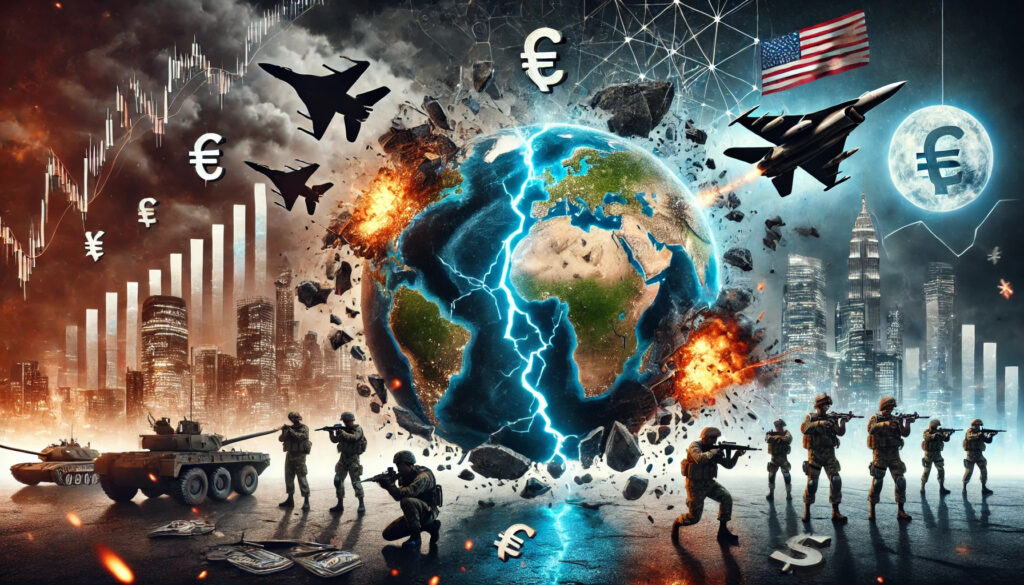In the shadow of escalating global tensions, the possibility of World War III is no longer just a scenario from dystopian fiction—it’s becoming a disturbing reality. The conflicts we’ve witnessed in recent decades—from Afghanistan to Syria to Ukraine—might pale in comparison to the catastrophe that could unfold if global superpowers decide to engage in an all-out war. Beyond the battlefield, such a war would wreak havoc on the global financial system, stock markets, supply chains, and the daily lives of billions. But the real question is: are we prepared?

A Fractured Geopolitical Landscape
From the escalating NATO-Russia tensions, driven by the ongoing conflict in Ukraine, to the rising U.S.-China rivalry in the South China Sea, the world is more divided than ever. The Middle East, with the deep-rooted Israel-Palestine conflict and Iran’s growing influence, remains a tinderbox, while North Korea’s nuclear ambitions continue to flout international sanctions.
We are witnessing a multipolar world, where the United States no longer holds uncontested dominance. Emerging powers such as China, India, and Russia are all vying for influence—not only geopolitically but also in terms of control over crucial resources like oil, rare earth minerals, and cutting-edge technologies. The world has become a high-stakes chessboard, where one wrong move could ignite a global war.
Financial Implications of a Global War: A Looming Economic Disaster
The financial consequences of World War III would be catastrophic. Historical precedents like World War II saw global GDP shrink by 15%, and in today’s interconnected global economy, the results could be even more devastating.
According to a Credit Suisse study, a global conflict could wipe out 10% of global stock market capitalization within days. Imagine the S&P 500 plummeting, the FTSE 100 crashing, and commodity prices like oil and wheat skyrocketing beyond imagination. The ripple effects of a war between two major nations would be felt across markets worldwide, leading to mass unemployment, inflation, and a potential global recession.
Financial Implications of a Global War: A Looming Economic Disaster
Oil is the linchpin of the global supply chain, and its price volatility can bring economies to their knees. The Ukraine-Russia war already demonstrated how vulnerable the world’s energy markets are. In the event of a broader conflict, particularly involving the Middle East, experts estimate that oil prices could soar to $300 per barrel—a figure that would send shockwaves through every industry.
For perspective, during the 1973 oil crisis, prices quadrupled, resulting in a global recession. Now, imagine that happening on a scale ten times larger in the midst of war.
Global Debt: A Ticking Time Bomb
With global debt sitting at a staggering $307 trillion (Institute of International Finance), the economic disruption caused by a global war would be unfathomable. Nations would face higher borrowing costs, leading to debt defaults in both developing and developed countries. The ensuing financial chaos could make the 2008 financial crisis look like a mere hiccup.
Cyber Warfare: The New Battlefield
In the next global conflict, the battleground won’t just be physical—it will be digital. Cyber warfare could paralyze entire economies by targeting critical infrastructure such as electric grids, banking systems, and transportation networks.
A report by Accenture estimates that cybercrime already costs the global economy over $1 trillion annually. Now, imagine these attacks being weaponized in a war scenario. Global banks could see their systems compromised, leading to the potential loss of trillions of dollars overnight.
The World Is Not Ready for World War III
Despite the looming threats, most nations are underprepared for a large-scale, prolonged conflict. Global military spending as a percentage of GDP stands at 2.2% (SIPRI), a fraction of what it was during the Cold War. With a diminished focus on defense, reliance on nuclear deterrents, and diplomatic efforts, we are ill-prepared to face a world at war.
More concerning is the lack of societal readiness. Most people have never experienced global war. Our globalized supply chains have created an illusion of stability, but even a minor disruption could lead to famine, energy shortages, and mass unrest. Picture major cities like London or New York without power for weeks—our digital-first world is far more fragile than we realize.
Can We Prevent World War III?
The best course of action is to prevent this looming disaster. Diplomatic channels must remain open, and organizations like the United Nations and World Trade Organization must step up as mediators. World powers need to recognize that the economic costs of war far outweigh any potential geopolitical gains.
Instead of focusing on military buildups, nations should invest in peace-building initiatives, global cooperation, and technological safeguards. Sanctions, while necessary at times, must be carefully evaluated to ensure they don’t push fragile relationships beyond the breaking point.
Conclusion: Are We Prepared for the Aftermath of War?
If World War III occurs, the financial and human cost will be unparalleled in history. Our broken supply chains, fragile financial systems, and underfunded defense infrastructures make the world grossly unprepared for such a calamity. Now is the time to prioritize diplomacy, cooperation, and peace-building over posturing. The very foundation of global financial stability depends on it.
We are at the precipice of potential devastation. The choice is ours: will we step back and safeguard the future, or will we plunge into an abyss from which we may never recover?







